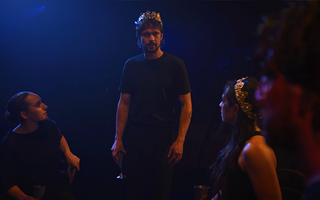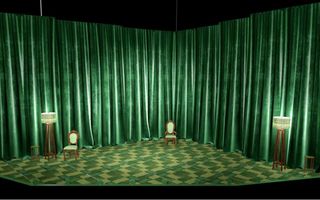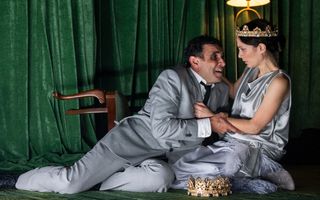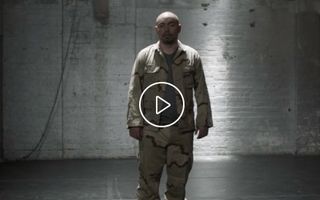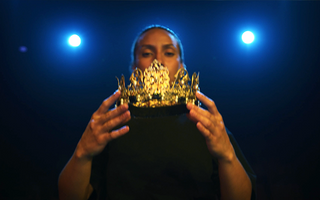 Watch
Watch
MACBETH
Stars, hide your fires
Let not light see my black and deep desires.
Act 1, Scene 4
Macbeth is a general in the Scottish army and commences the play as the Thane of Glamis, a lord of the Scottish Court. Before we meet Macbeth, we hear a report of him from a wounded captain, “For brave Macbeth – well he deserves that name.” (Act 1, Scene 2), who details his prowess in battle. Macbeth first appears in Act 1, Scene 3 accompanied by his friend and comrade, Banquo, who clearly holds him in high regard. When Macbeth receives the witches prophecies he does “start and seem to fear” (Act 1, Scene 3) them but his instinct is to dismiss things that are dark and threatening. It is important to note that Macbeth’s drive to usurp the crown is shared with the audience after we hear the witches’ prophecies and therefore it is not clear whether he would have taken the same path if he hadn’t encountered the witches on the blasted heath.
Macbeth is a character that undergoes a dramatic transformation as the result of ambition and the pursuit of power. By Act 5 the audience are left in bewilderment, questioning whether they are observing the same man that was described in Act 1 as “brave”, “honourable” and “too full of the milk of human kindness” (Act 1, Scene 5). Even as early as the 1700’s, critics were writing about Macbeth’s extraordinary change in character. William Richardson stated in 1743 that Macbeth begins the play as ‘valiant, dutiful to his sovereign, mild, gentle and ambitious without guilt’, and ends his journey as ‘false, disloyal, barbarous and vindictive’. Macbeth spends the first half of the play in moral contemplation, recoiling at the very thought of wrongdoing. In the second half of the play he is driven by violent matter-of-factness, as soon as a bloody thought comes into his head he acts on it, “Be it thought and done” (Act 4, Scene 1). Unlike another of Shakespeare’s villains, Richard III, who seeks power for power itself, Macbeth initially desires power only to gain regard and respect from his colleagues. In a comparison of the two characters, Thomas Whately says that unlike Richard III, Macbeth’s instincts are naturally ‘social, humane and family orientated’.
Many believe Lady Macbeth’s insights into Macbeth’s character to be more trustworthy than that of other characters in the play, as she knows him intimately. She states that he is “too full of the milk of human kindness” to act maliciously, and that he could stare “the ornament of life” (Act 1, Scene 7) meaning the crown, in the face and still not seize it. However, we do see evidence that Macbeth is ambitious. On hearing of Malcolm’s ascension to be next in line for the throne, Macbeth lets the audience know of his “black and deep desires” (Act 1, Scene 4), and in his letter to Lady Macbeth we learn that he is not only “rapt in the wonder of it” (Act 1, Scene 5) but also “burned in desire.” (Act 1, Scene 5) We observe ambition in Macbeth, but his thoughts don’t transfer into actual plans. The idea of murdering King Duncan comes from Lady Macbeth and when faced with the actuality of it, Macbeth realises that he has “no spur to prick the sides of (his) intent” (Act 1, Scene 7), and that “vaulting ambition” is not a good enough motive for murder. We witness his weaknesses: pride, ego and an immense love for his wife. Lady Macbeth challenges his love and his manhood, informs him that this act will make him “so much more the man” (Act 1, Scene 7) and even stirs up memories of their loss of a child. With this Macbeth is convinced to murder Duncan, though it is not clear which tactic of Lady Macbeth’s had the biggest impact on his decision.
Macbeth immediately regrets killing King Duncan. Even prior to the act he hallucinates, “Is this a dagger I see before me...” (Act 2, Scene 1) and struggles to control his guilty thoughts. After the murder he instantly acknowledges that he will likely never sleep again. He dramatises the “sorry sight” (Act 2, Scene 2) of the blood on his hands as something “great Neptune’s oceans” cannot wash away, begins to hear voices and acts erratically, killing Duncan’s two guards without consulting his wife. Once crowned, Macbeth’s paranoia grows, “full of scorpions is my mind “ (Act 3, Scene 2), and he becomes increasingly estranged from his wife, “be innocent of the knowledge dearest chuck” (Act 3, Scene 2). Behaviour that once seemed inconceivable to Macbeth, “I am afraid to think on what I’ve done” (Act 2, Scene 2), becomes commonplace. He murders his friend Banquo and his fellow soldier Macduff’s wife and children. Macbeth can now suppress contemplation but his subconscious guilt starts to surface. It emerges in the vision of Banquo’s ghost, which sends Macbeth into a public display of guilt, madness, irrationality and a fear of losing his manhood: “Why so, being gone, I am a man again.” (Act 3, Scene 4)
Macbeth’s increasing anxiety and disconnection from reality is highlighted by his return visit to the witches. He receives further prophecies, convinces himself that he is invincible and his strength and confidence now lies in the witches’ riddle-like predictions. In his final demise, Macbeth shows little humanity, yet at the same time all the humanity one can imagine. He cannot muster remorse for his actions or his wife’s death, yet poetically muses on the pointlessness of his existence:
Life’s but a walking shadow, a poor player
That struts and frets his hour upon the stage
and is heard no more: It is a tale told by an idiot,
Full of sound and fury, signifying nothing.
Act 5, Scene 5
Macbeth can be thought of as an anti-hero, or as a tragic hero who falls at the hand of personal moral weaknesses. His fatal flaw is usually considered his ambition. Unlike Romeo, Othello or Brutus, Macbeth does not contemplate suicide when his situation is grim, in fact he rails against it: “Why should I play the Roman fool and die on mine own sword?” (Act 5, Scene 10). At the end of the play Macbeth has lost everything except his sword and his military skills, and neither can protect him. He is killed by Macduff, and Malcolm takes his rightful place as King of Scotland.
LADY MACBETH
What’s done is done.
Act 3, Scene 2
Lady Macbeth is one of Shakespeare’s best-known and most complex female characters. She is strong, intelligent and clearly has a loving and trustworthy relationship with her husband who intimately calls her his “dearest partner of greatness” (Act 1, Scene 5). In the opening act Macbeth not only shares all his dealings and innermost thoughts with her, but also allows her to take charge of their social progression: “leave all the rest to me” (Act 1, Scene 5). Lady Macbeth indicates that she has previously lost a child, “I have given suck and know how tender tis to love the babe that milks me” (Act 1, Scene 7), which brings up questions about past traumas in her life and their relationship. She plots the murder of King Duncan with her husband and pushes him to continue with the deed despite his rising doubt and reluctance.
In the patriarchal society of medieval Scotland, Lady Macbeth can only progress by attaching herself to the rise of her husband: there is no place for her to have ambitions of her own. Actress Judy Dench stated in an interview that she believes Lady Macbeth is driven by an intense love for her husband, but we can never be sure of Shakespeare’s true intentions. After receiving Macbeth’s news of the witches’ prophecies and Duncan’s arrival, Lady Macbeth is quick to action. She immediately aligns herself with dark “spirits” and begs them to: “Unsex me here” (Act 1, Scene 4), wishing to shed all qualities traditionally thought of as feminine. John Bell notes, like many literary critics, that Lady Macbeth lacks imagination. She can see no other repercussions of their bloody deed than the advancement that she desires. She sees only the practical, believes that “a little water” (Act 2, Scene 2) will wash the deed clean from their hands, and even suggests to Macbeth that he will be fine if he simply does not “think” on what he has done. The only sign of Lady Macbeth wavering from their goal, prior to the murder, is when she informs the audience that she would have killed King Duncan herself, but that he reminded her too much of her own father.
Despite Lady Macbeth’s initial bravado, she does not manage to maintain her strength and composure. While Macbeth parlays his guilt into a string of brutal murders, Lady Macbeth’s guilt drives her into depression and madness. She is devastated by her husband’s cold distance from her and doesn’t feel content in her new position: “Nought’s had, all’s spent / Where our desire is got without content.” (Act 3, Scene 2) When we last see her she is sleepwalking through the castle, wiping imagined blood from her hands: “Out, damned spot! Out, I say!” (Act 5, Scene 1) This moment is the climax of her madness and her subsequent death is not seen on stage, but is reported to Macbeth by Seyton. Its absence from the text leaves the details of her death to the imagination of the audience.
THE WEIRD SISTERS
Fair is foul, and foul is fair.
Act 1, Scene 1
The Weird Sisters, or ‘witches’, open the play, and their contrasting energy and language patterns plant a sense of mystique and intrigue. Although they refer to each other as “Sister” and collectively call themselves the “Weird Sisters” (Act 1, Scene 3), they are conventionally known as ‘the Witches.’ The Sisters are enormously powerful in their manipulation of Macbeth, yet they do not actually cast a spell on him, they only deliver predictions and conjure apparitions. The Sisters often speak in a different rhythm to other characters in the play. Instead of pentameter, they use tetrameter (four strong beats to a line) when chanting or casting spells, and trochaic pentamter rather than iambic pentameter (emphasis on the first syllable, rather than the second). Shakespeare often used this form for magical or supernatural characters throughout his work. There is much contention over whether the Sisters are to blame for Macbeth’s demise, or whether it is Macbeth’s own fault for acting upon their prophecies.
BANQUO
Merciful powers, Restrain in me the cursed thoughts that nature gives way to in repose!
Act 2, Scene 1
Banquo is a Scottish general and close friend and comrade to Macbeth. Banquo is father to Fleance, who also appears in the play. Banquo and Macbeth witness the Weird Sisters’ initial prophecies together. At the beginning of the play, Banquo and Macbeth display a strong comradeship, and Banquo warns him not to pay too much attention to the Sisters’ prophecies, calling them “instruments of darkness” (Act 1, Scene 3). Despite both receiving prophecies, Macbeth acts on the Weird Sisters’ predictions whereas Banquo does not, despite his seeming interest. He does however think of them and shares this with Macbeth the night of the murder: “I dreamed last night of the three Weird Sisters; to you they have showed some truth.” (Act 2, Scene 1) According to the Sisters’ prophecy, Banquo’s children will inherit the Scottish throne. Banquo becomes suspicious of Macbeth after Duncan’s death, and Macbeth plots his murder as well as his son, Fleance. However, the planned murder goes awry when Banquo is murdered but Fleance escapes. After Macbeth has him killed, Banquo’s ghost haunts Macbeth at the royal banquet table.
KING DUNCAN
He was a gentleman on whom I built an absolute trust.
Act 1, Scene 4
King Duncan is the epitome of a noble and virtuous leader, well-loved by his people and the nobleman who serve him. Macbeth says that Duncan’s soul is so holy that if he were to be killed “his virtues will plead like angels, trumpet-tongued, against the deep damnation of his taking-off.” (Act 1, Scene 7) Duncan is however, naive and unaware of the true character of his followers and seems to take people at face value. He acknowledges this early in the play when he speaks of the traitorous Thane of Cawdor as a “gentleman on whom I built an absolute trust.” (Act 1, Scene 4) When Macbeth and Banquo arrive back from victorious victory, Duncan greets them warmly, congratulating them for their prowess in battle and promises great things for Macbeth:
I have begun to plant thee, and will labour
To make thee full of growing.
Act 1, Scene 4
Duncan has two sons, Malcolm, his anointed successor, and Donalbain. Despite Macbeth’s great respect for King Duncan, his ambition for power takes over and he murders Duncan while he is asleep in Macbeth’s castle. Being unlawfully usurped, Duncan's death reflects the destruction of order in Scotland.
MACDUFF
Bleed, bleed, poor country.
Act 4, Scene 3
Macduff, the Thane of Fife, is another Scottish nobleman in the play. He is fiercely patriotic and loves his country dearly. In this way, Macduff is set up in opposition to Macbeth, one lord who wants the best for his country, and one lord who cares more for his own ambitions. Macduff is a loyal soldier and general, well-liked by others. Macduff is suspicious of Macbeth’s rise to the throne from the beginning. He is not present at Macbeth’s castle on the night of the murder, only arriving the following morning. By going to his home in Fife instead of to Scone for Macbeth’s coronation, he sends a signal that he does not support Macbeth’s kingship and is therefore considered a traitor. After receiving the witches’ prophecy to “beware Macduff”, Macbeth orders the brutal murder of Macduff’s wife and children. Macduff feels this devastating loss deeply: “I must also feel it as a man” (Act 4, Scene 3). Macduff makes note in his rage and despair that Macbeth has no children, further clarifying their differences. Macduff joins Malcolm in leading a rebel army to unseat Macbeth and to place Malcolm on the throne. At the end of the play, Macduff revenges and kills Macbeth in battle, killing Macbeth and presenting his severed head to Malcolm.
MALCOLM
What I am truly is thine and my poor country’s to command.
Act 4, Scene 3
Malcolm is the elder son of King Duncan. In Act 1 he is anointed Prince of Cumberland, successor to the throne, by his father. After Duncan is murdered, Malcolm escapes to England, fearing he may be killed next. Later, Malcolm employs shrewd rhetoric to test Macduff’s loyalty to the throne. Pleased with the outcome, he joins with Macduff and the English forces to form a rebel army against Macbeth. Malcolm marches on Scotland to take the crown. After Macduff kills Macbeth at the end of the play, Malcolm assumes the throne, promising to reconcile with both friends and enemies.
FLEANCE
Fly, good Fleance, fly, fly, fly!
Banquo, Act 3, Scene 3
Fleance is Banquo’s young son. He escapes the murderers that Macbeth has sent to kill him. He has no further role in the play after this, yet the audience is left to assume that he or his children may come to rule Scotland one day, as in the Weird Sisters’ prophecy.
LADY MACDUFF
Whither should I fly?
I have done no harm.
Act 4, Scene 2
Lady Macduff is the wife of Macduff and is left at home in their castle with their children while Macduff flees to England. Because of this, she believes Macduff is a traitor. She laments that her husband must not love her or their family because he has left them for England. Ross, a relation of Lady Macduff, speaks with her before a messenger arrives at their castle to warn them that they are about to be in great danger. However it is too late, murderers sent by Macbeth arrive and kill Lady Macduff and her children, as brutal revenge on Macduff.
